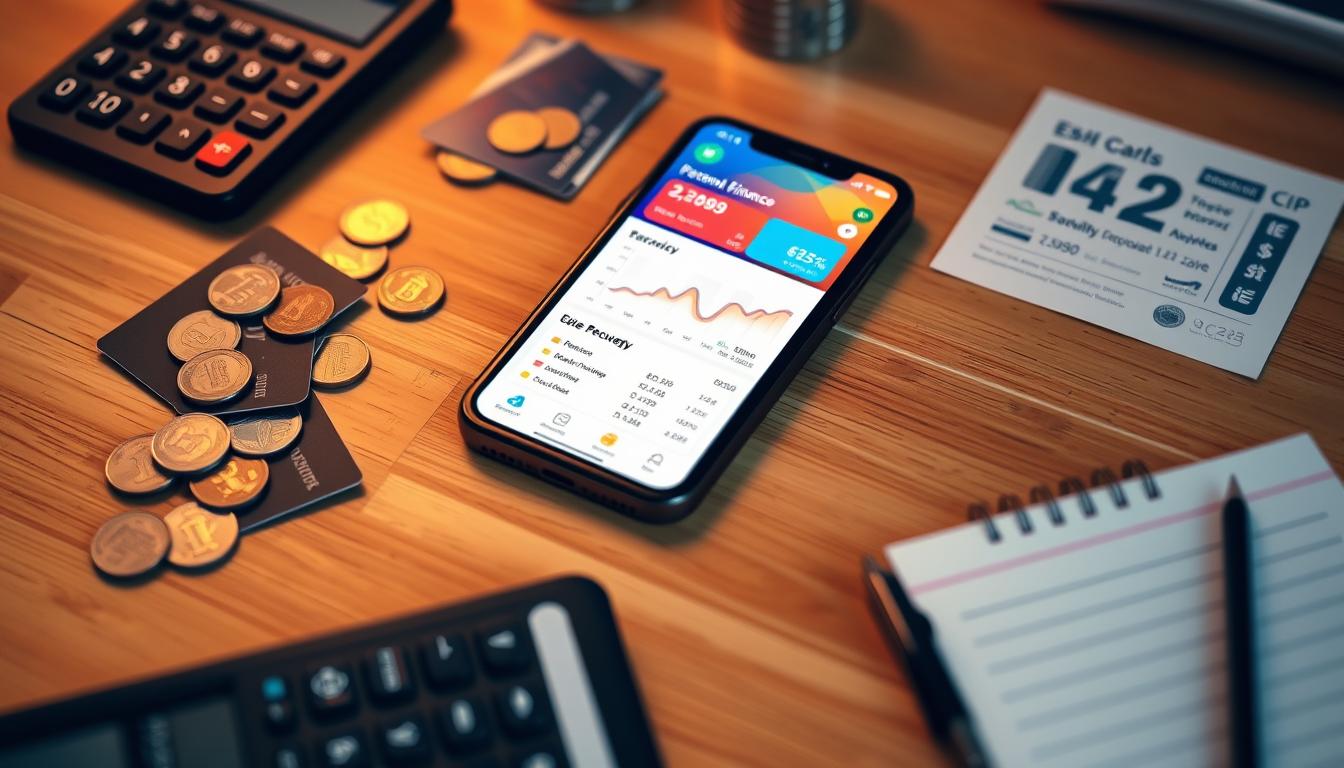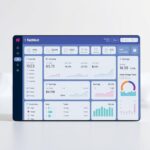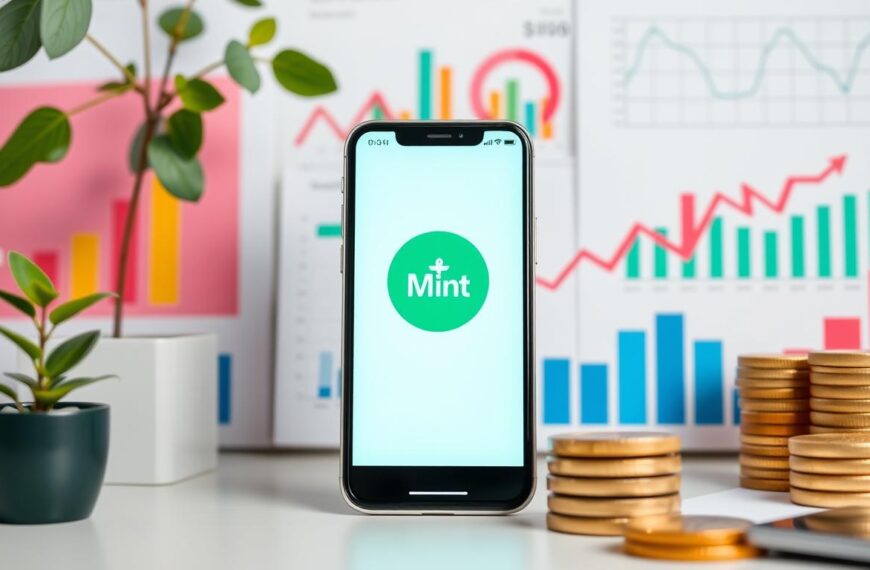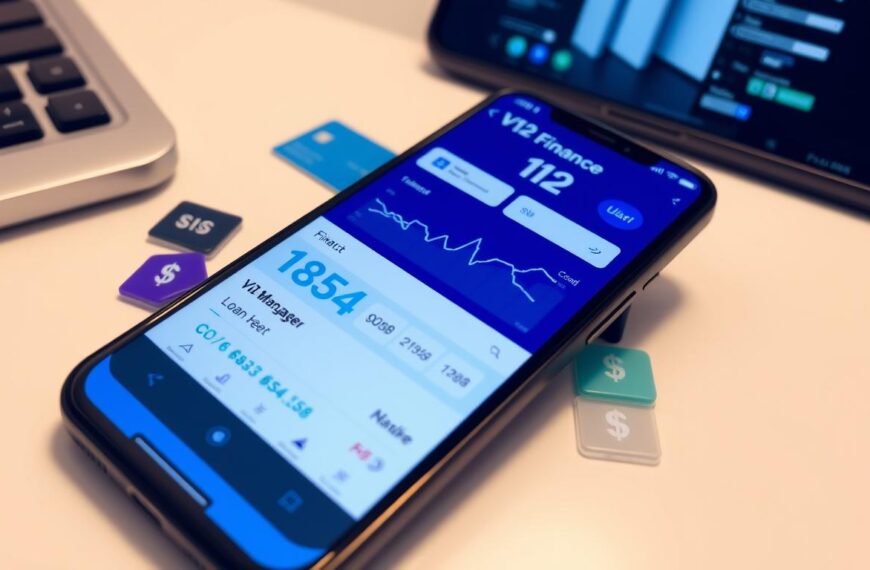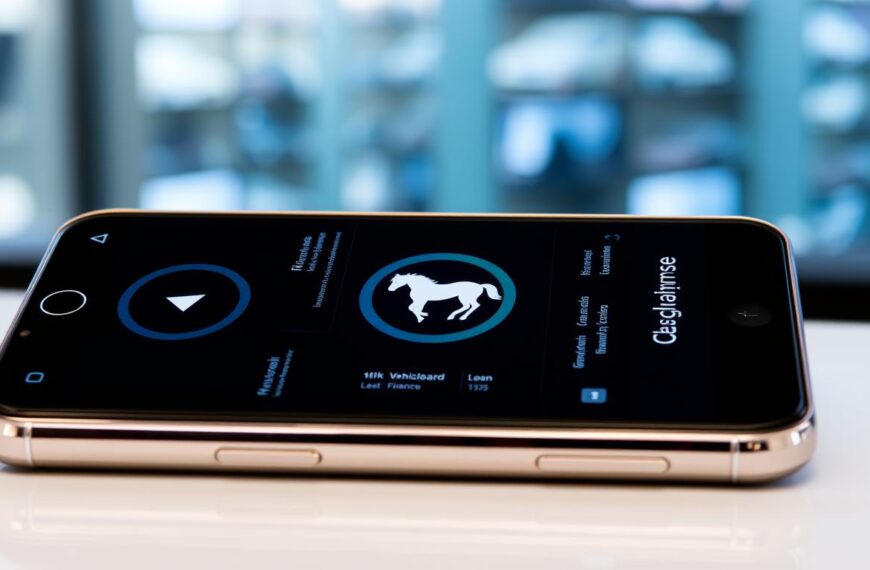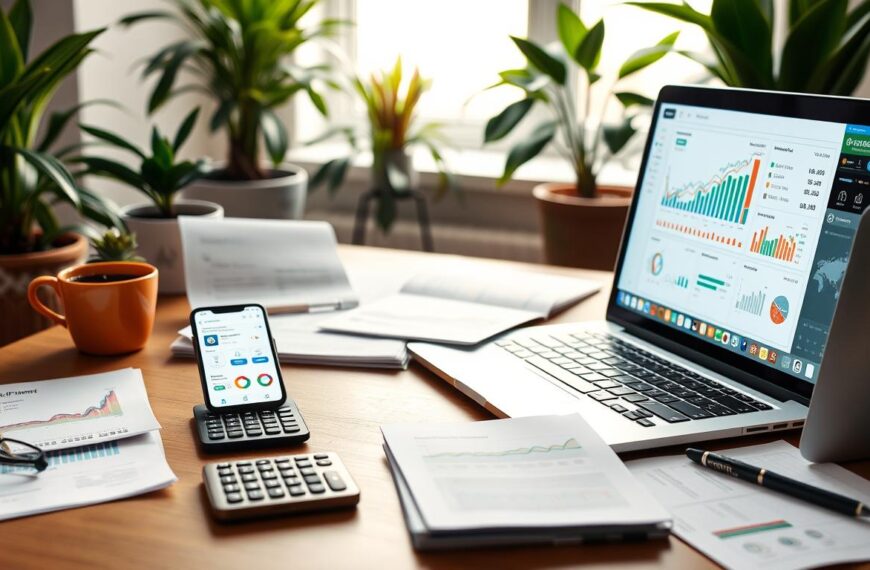In today’s world, managing money well is key. The rise of technology has brought personal finance apps to the forefront. These budgeting apps offer insights into spending, help set financial goals, and track cash flow easily. Whether you are starting out or improving your finances, using UK personal finance apps can aid in making wise choices. They set you on the path to stability and growth. Start with these apps to boost your financial health and handle your money expertly.
It’s vital to manage your finances well, given the variety of tools available. For instance, Octopus Money offers tailored advice. Apps like Emma and HyperJar are great for different budgeting needs. These platforms make money management smarter and saving simpler123.
The Importance of Managing Your Finances Effectively
Handling your money wisely is key to a healthy financial life and hitting your money goals. It’s vital to know your income, outgoings, and what you’re saving. This helps in making smart choices. But, doing this well can be tough without a little help. Finance apps are great because they give tools like budgeting and managing debts, which make keeping an eye on finances simpler.
Understanding Your Financial Health
Knowing how much money you have is crucial. This means watching what you earn from jobs, investments, and any extra work. Finance apps put spending into categories and show where your money goes4. They make sure you’re spending within your budget. These apps help save money for now and later. They show your debts and when to pay them. This makes getting rid of debt and staying stable easier4.
How Personal Finance Apps Can Help
Finance apps really simplify managing money. With apps like Mint and YNAB, you can see all your accounts and cards in one spot. They automatically track your spending5. This helps watch your budget and decide better on how to spend. These tools also help chase your financial dreams by setting and reaching goals. They reduce the worry of planning finances, offering tips tailored to you. This is all backed up by smart tech5.
Key Features to Look for in a Personal Finance App
Choosing the right personal finance app is crucial. You need to know what features matter the most. Each one plays a big role in making financial management easier.
Budgeting Tools and Features
An effective app should make budgeting simple. It lets you set up, follow, and adjust your budget with ease. With real-time spending tracking, you can spot overspending early on6. This means you can quickly adapt to changes in your finances.
Integration with Bank Accounts Through Open Banking
Connecting your bank accounts to the app is essential. It allows for automated transactions updates, which cuts down on errors7. This connection gives you a full view of your money across different accounts without hassle.
Security and Data Protection Measures
Keeping your information safe is key in a finance app. Features like biometric access and encryption keep your data secure8. It’s important that the app meets legal standards and is regularly checked for vulnerabilities. A great app also has an easy-to-use interface, making finance management both simple and enjoyable.
| Feature | Description | Importance |
|---|---|---|
| Budgeting Tools | Allows users to create and manage budgets. | Enhances financial planning and tracking. |
| Bank Account Integration | Links user bank accounts for automated data entry. | Provides real-time overview of finances. |
| Data Security | Utilises encryption and authentication methods. | Protects user information from breaches. |
Top Personal Finance Apps to Consider
Managing your finances can seem daunting, but there are standout apps that help. These best personal finance apps enable users to budget, track spending, and save with ease. Let’s explore the top choices in the UK.
Emma: Your Spending Buddy
Emma is known for its detailed spending analysis and tracking subscriptions. Since 2018, it has gained over 1.6 million customers. The app makes budgeting fun by identifying spending habits and suggesting ways to save9.
HyperJar: The Jar Method of Budgeting
HyperJar uses a unique jar method for budgeting, dividing money into different categories. With a 4.6 out of 5.0 on Trustpilot, it shows user satisfaction9. The app makes saving for future expenses easy and helps in managing finances better.
Plum: Saving Made Easy
Plum automates savings through round-ups and savings pockets. It links accounts providing valuable insights to foster saving habits. This app suits those looking for a passive way to increase their savings while sticking to a budget.
Snoop: Personalised Money Suggestions
Snoop offers personalized advice on spending and saving by tracking bills and recommending cheaper alternatives. With a Trustpilot rating of 3.1 out of 5.0, it shows potential for growth and user satisfaction9.

| App Name | Key Features | Trustpilot Rating |
|---|---|---|
| Emma | Spending analysis, subscription tracking | N/A |
| HyperJar | Jar-based budgeting | 4.6/5.0 |
| Plum | Automated savings, round-ups | N/A |
| Snoop | Personalised insights, tracking bills | 3.1/5.0 |
These apps do more than track your money. They offer insights and solutions tailored to your needs. This makes managing personal finance much easier.
Comparing Free vs Paid Features of Finance Apps
Exploring personal finance apps means looking at free versus paid ones. Free apps offer essential tools for budgeting and tracking. They’re perfect for beginners to try managing finances without spending money.
Advantages of Free Apps
Free finance apps are great for those starting their financial journey. For example, Money Dashboard is free and lets users link several accounts easily10. It gives updates on balances and automatic spending categorisation. Users can set budgets and tailor their spending categories at no cost.
Understanding Subscription Models
Paid finance app features offer more advanced tools. Snoop, for example, has a plan called Snoop Plus for £4.99 a month, adding extra features10. This plan helps track spending effectively and includes custom reports and balance alerts. Snoop stands out with unique saving tools and connections to over 61 banks, useful for detailed financial tracking10.
While free apps are a great start, paid apps provide deeper financial management. They offer more specialized features for tracking investments and tailored budgeting. It’s ideal for users who need more from their finance tools.
Conclusion
Using personal finance apps is key for anyone wanting to get better at handling their money in the UK. These apps help you keep an eye on what you spend and make better budget plans. The fact that money management apps were downloaded over 573 million times in the US shows how important they are worldwide11.
Picking an app that fits your money goals can make you feel more secure about your finances.
The world of personal finance apps is always changing. Knowing the latest updates can help you make smarter choices. Studies show that people who use these apps feel more confident and know more about managing their money12. But, it’s important to remember that using these apps alone might not solve all money problems.
To really improve your finances, think about how you can use these apps in your day-to-day life. Whether it’s for budgeting, saving, or tracking spending, picking the right app can offer bespoke solutions. This can greatly improve how you manage your money11.
FAQ
What is a personal finance app?
A personal finance app is a digital tool for managing your money better. It has features like budget planning, tracking expenses, and setting savings goals. These features help you take control of your finances.
How can personal finance apps improve my financial health?
Personal finance apps offer a clear insight into how you spend your money. They help you set and follow budgets while tracking savings and expenses. Plus, they provide debt management tools and help in achieving financial goals.
Are there free personal finance apps available in the UK?
Yes, there are free personal finance apps in the UK, such as Emma and Snoop. They provide basic budgeting tools and tracking features, perfect for beginners in financial management.
What features should I look for in a personal finance app?
Look for budgeting tools, bank account syncing, tight security, and easy navigation in a personal finance app. These features make managing your money simpler and more efficient.
How do paid versions of personal finance apps differ from free versions?
Paid personal finance apps include more features like investment tracking and detailed reports. They also let you link multiple accounts for deeper financial insight. These advanced features assist in reaching your finance goals.
Is my financial data safe with personal finance apps?
Quality personal finance apps use strong security measures, like encryption. They comply with GDPR laws to protect your data. Always check the app’s security features and read user reviews to ensure your data’s safety.
Can personal finance apps help with debt management?
Yes, personal finance apps are great for managing debt. They help you track what you owe, set repayment targets, and view your progress. This way, you can gradually reduce your debt.
How do I choose the best personal finance app for my needs?
To pick the best app, consider what financial goals you have and what features you need. Think about ease of use and whether you’d like a free or paid app. Checking reviews and exploring various apps will guide your choice.

